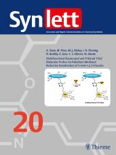
SYNLETT
Scope & Guideline
Pioneering Innovative Pathways in Organic Chemistry
Introduction
Aims and Scopes
- Synthetic Methodologies:
The journal emphasizes the development of new synthetic methodologies, particularly those that enhance efficiency, selectivity, and sustainability in organic synthesis. - Catalyst Development:
A significant focus is on the design and application of novel catalysts, including transition metal catalysts, organocatalysts, and photocatalysts, to facilitate a variety of chemical transformations. - Total Synthesis:
SYNLETT publishes comprehensive studies on the total synthesis of complex natural products, showcasing innovative strategies that highlight the creativity and versatility of synthetic organic chemistry. - Functionalization Strategies:
The journal covers diverse functionalization strategies, including C-H activation, cross-coupling reactions, and electrophilic functionalization, which are crucial for the modification of organic compounds. - Green Chemistry:
The journal promotes methodologies that align with green chemistry principles, focusing on reducing waste, using renewable resources, and developing sustainable synthetic routes. - Multicomponent Reactions:
SYNLETT highlights research on multicomponent reactions as a powerful approach to efficiently construct complex molecular architectures in a single step.
Trending and Emerging
- Photoredox Catalysis:
The rising trend in photoredox catalysis reflects an increasing interest in harnessing light to drive chemical reactions, providing sustainable pathways for organic synthesis. - C-H Activation Techniques:
C-H activation has gained prominence as a key strategy for functionalizing complex molecules, allowing for more efficient and selective transformations. - Sustainable Organic Synthesis:
There is a growing emphasis on sustainable practices, including the use of renewable resources and eco-friendly reagents, aligning with global efforts towards green chemistry. - Asymmetric Synthesis:
The demand for enantioselective synthesis remains strong, with innovative methodologies being developed to achieve high levels of stereocontrol in complex organic molecules. - Multicomponent and Cascade Reactions:
The popularity of multicomponent and cascade reactions is on the rise, as they allow for the rapid construction of complex molecular architectures in fewer steps.
Declining or Waning
- Traditional Organic Synthesis Techniques:
The journal has seen a reduction in papers focusing solely on traditional organic synthesis techniques, as researchers increasingly seek innovative and efficient methodologies. - Inorganic Chemistry Applications:
There has been a noticeable decline in publications that focus on the applications of inorganic chemistry within organic synthesis, suggesting a shift towards more interdisciplinary approaches. - Conventional Catalysis Methods:
Research centered on conventional catalysis methods without innovative modifications or new insights is becoming less prevalent, as the field moves towards more advanced catalytic strategies. - Synthesis of Simple Molecules:
There is a waning interest in the synthesis of simple molecules, with a growing emphasis on complex structures and multifunctional compounds, reflecting the evolving challenges in synthetic organic chemistry.
Similar Journals

ORGANIC SYNTHESES
Advancing the Frontiers of Organic ChemistryORGANIC SYNTHESES is a prestigious journal dedicated to the field of organic chemistry, published by ORGANIC SYNTHESES INC. Since its inception in 1946, the journal has served as a vital platform for researchers, educators, and practitioners in chemistry, showcasing significant findings and methodologies that advance the discipline. Although it currently does not offer open access, it is recognized for its rigorous peer-review process and its contribution to standardizing organic synthesis methods. With an ISSN of 0078-6209 and an E-ISSN of 2333-3553, the journal's impact reflects its quality, with a current Scopus ranking placing it in the fourth quartile in both Organic Chemistry and Physical and Theoretical Chemistry. This positioning underscores its critical role in fostering knowledge and innovation within these fields. Researchers and students alike will find ORGANIC SYNTHESES an essential resource for staying informed on contemporary practices and discoveries in organic synthesis.

Nature Synthesis
Exploring Novel Pathways in ChemistryNature Synthesis, published by SpringerNature, is a premier peer-reviewed journal dedicated to advancing the field of synthesis in chemistry and materials science. With an impressive impact factor and categorized in the Q1 quartile for Chemistry (miscellaneous), Inorganic Chemistry, Materials Chemistry, and Organic Chemistry, it ranks prominently among its peers, reflecting its high-quality research output and relevance.
This journal provides a platform for researchers, professionals, and students to publish innovative synthesis methodologies, novel materials, and interdisciplinary approaches that push the boundaries of chemistry. Operating under an Open Access model, it ensures that research is widely accessible, fostering collaboration and engagement across the global scientific community.
Situated in the United Kingdom, Nature Synthesis is committed to contributing to the scientific discourse from 2022 to 2024, and beyond, as it continues to highlight significant advancements across chemistry domains.

ACS Organic & Inorganic Au
Catalyzing Discoveries in Open Access ChemistryACS Organic & Inorganic Au, published by the American Chemical Society, stands as a premier open-access journal dedicated to advancing the fields of organic and inorganic chemistry. Since its inception in 2021, this journal has swiftly risen to prominence, achieving a commendable Q1 classification in Inorganic Chemistry, Organic Chemistry, and Physical and Theoretical Chemistry as of 2023. With an ISSN of 2694-247X, it provides a vital platform for researchers, professionals, and students to disseminate their findings and engage with cutting-edge work across converged disciplines. Operating from its headquarters in Washington, DC, ACS Organic & Inorganic Au is committed to fostering a collaborative research environment, encouraging rigorous peer review, and ensuring the wide accessibility of high-quality scholarly articles. With its open-access model, readers worldwide can freely access and utilize research findings, promoting a global exchange of knowledge crucial for driving innovation in chemistry.
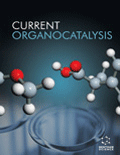
Current Organocatalysis
Connecting Researchers in the World of OrganocatalysisCurrent Organocatalysis is a premier academic journal dedicated to the dynamic field of organocatalysis, published by Bentham Science Publishers, Ltd. Based in the United Arab Emirates, this journal has been a valuable resource for researchers since its inception in 2014 and will continue to publish impactful articles until 2024. The journal provides a platform for sharing groundbreaking research, reviews, and insights that significantly contribute to the fields of Analytical Chemistry, Catalysis, and Organic Chemistry. With a Q4 ranking in several chemistry categories, it identifies and disseminates emerging strategies and methodologies in organocatalysis, promoting collaboration and advancement in the community. While it operates on a subscription basis, the journal ensures accessible content for its audience to further supplement academic learning and professional development. Researchers, professionals, and students are encouraged to explore and contribute to this critical field, leveraging the journal as an essential resource for the latest trends and innovations in organocatalysis.
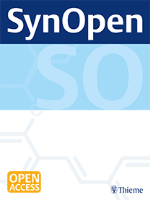
SynOpen
Connecting Researchers, Elevating DiscoveriesSynOpen is an esteemed open-access journal published by GEORG THIEME VERLAG KG, based in Germany, dedicated to advancing the fields of Biomaterials, Catalysis, Materials Science, and Organic Chemistry. Since its inception in 2017, the journal has established itself as a vital platform for researchers wishing to disseminate their findings in a rapidly evolving scientific landscape, earning a commendable Q2 ranking in Materials Science (miscellaneous) and Q3 in other key categories for 2023. With an increasing impact on its disciplines, SynOpen aims to foster interdisciplinary collaboration and innovation by providing unrestricted access to high-quality research, thus promoting a broader reach and visibility for authors. Scholars, professionals, and students alike can benefit from the comprehensive range of topics covered, as the journal's commitment to presenting cutting-edge studies and methodologies positions it as a crucial resource for contemporary scientific inquiry.
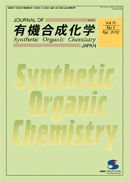
JOURNAL OF SYNTHETIC ORGANIC CHEMISTRY JAPAN
Empowering scholars to master the art of organic chemistry.JOURNAL OF SYNTHETIC ORGANIC CHEMISTRY JAPAN, published by the SOCIETY OF SYNTHETIC ORGANIC CHEMISTRY, JAPAN, is an esteemed publication specializing in the dynamic field of organic chemistry. With a rich history dating back to 1944, this journal aims to disseminate pivotal research findings and innovative methodologies in synthetic organic chemistry, fostering collaboration and knowledge exchange among researchers and professionals. Although it currently holds a modest ranking in the Q4 quartile for organic chemistry, its commitment to advancing the discipline remains steadfast. The journal primarily caters to scholars and students seeking to delve deeper into organic synthesis, highlighting original articles, reviews, and methodological studies. While access to the journal is not open, its contributions to the field are essential for anyone invested in understanding the complexities of organic chemistry. We invite you to explore the journal's offerings and enhance your expertise in synthetic organic processes.
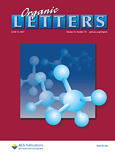
ORGANIC LETTERS
Leading the Charge in Organic Chemistry InnovationOrganic Letters is a leading peer-reviewed journal dedicated to the rapid dissemination of research in the field of organic chemistry. Published by the American Chemical Society, this esteemed journal has been an invaluable resource for researchers and professionals since its inception in 1999, featuring research articles that contribute significantly to the understanding of organic synthesis and related disciplines. With its impressive impact factor, it is currently ranked in the top quartile (Q1) across multiple categories, including Biochemistry, Organic Chemistry, and Physical and Theoretical Chemistry, showcasing its influence in the scientific community. The journal's commitment to quality is underscored by its high rankings in Scopus, placing it among the top tier of journals in its categories. While not an open-access journal, Organic Letters offers exceptional access options for institutions and individuals seeking cutting-edge research. As it continues to evolve towards its convergence year of 2024, it remains the go-to publication for innovative findings and methodologies in organic chemistry.

ARKIVOC
Advancing Organic Chemistry Through Open AccessARKIVOC is an esteemed open-access journal dedicated to the field of Organic Chemistry, published by ARKAT USA INC. Since its inception in 2000, ARKIVOC has aimed to disseminate high-quality research and advancements in organic chemistry, fostering an international exchange of knowledge within this ever-evolving discipline. With its ISSN 1551-7004 and E-ISSN 1551-7012, the journal is committed to providing accessible content free of charge to researchers, students, and professionals around the globe. Although currently categorized in the fourth quartile of Organic Chemistry with a Scopus rank of #188 out of 211, ARKIVOC continues to encourage the publication of innovative works and critical reviews that highlight emerging trends and methodologies in organic synthesis, reaction mechanisms, and material sciences. Its open-access model since 2000 ensures that valuable contributions to scientific knowledge are widely available, promoting collaboration and discovery. The journal is based in the United States, with its editorial office located at the University of Florida, under the guidance of prominent chemists. ARKIVOC provides an essential platform for those deeply engaged in organic chemistry research, supporting the advancement of science for future generations.
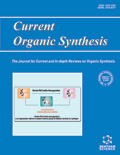
CURRENT ORGANIC SYNTHESIS
Innovating Synthesis, Inspiring DiscoveryCURRENT ORGANIC SYNTHESIS, published by Bentham Science Publishers Ltd, is a leading journal in the field of organic chemistry and biochemistry that serves as a vital platform for researchers and professionals advancing the synthesis of organic compounds. With an ISSN of 1570-1794 and an E-ISSN of 1875-6271, it boasts a significant impact within its category, ranked in the Q3 quartile for both biochemistry and organic chemistry as of 2023. The journal covers innovative research and reviews that enhance our understanding of organic synthesis methodologies, showcasing contributions that advance the field. Operating from Sharjah, United Arab Emirates, CURRENT ORGANIC SYNTHESIS has evolved since its inception in 2005, providing access to a wealth of information essential for students, professionals, and researchers alike. While it currently does not offer open access, the journal continues to maintain a strong community of scholars dedicated to fostering dialogue and innovation in the organic sciences.
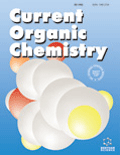
CURRENT ORGANIC CHEMISTRY
Delivering Pioneering Research in Organic ChemistryCURRENT ORGANIC CHEMISTRY, published by Bentham Science Publishers, stands as a pivotal platform in the field of organic chemistry, providing innovative insights and advancements since its inception in 1997. With an ISSN of 1385-2728 and an E-ISSN of 1875-5348, this esteemed journal has carved a niche in the academic landscape, currently ranking in the Q3 category for Organic Chemistry according to the 2023 metrics. Operating from the United Arab Emirates, it engages a diverse audience of researchers, professionals, and students by delivering quality peer-reviewed articles that cover a broad spectrum of organic chemistry research. Although the journal does not offer open access, it remains a respected source of knowledge, indexed in Scopus with a percentile ranking of 43, encouraging rigorous discourse and the dissemination of cutting-edge findings. With continuous publication through 2024, CURRENT ORGANIC CHEMISTRY is dedicated to advancing the frontiers of organic chemistry research and technology.